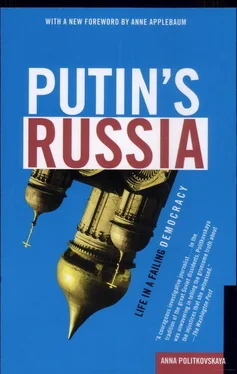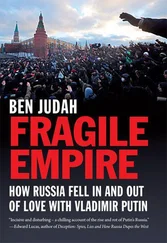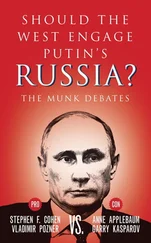Not a word was heard about the fact that throughout the Beslan hostage taking, it was Presidents Zyazikov and Dzasokhov, effectively Putin’s nominees, who behaved like cowards and liars. They provided about as much leadership as one can expect milk from a billy goat.
The proposed reform of the system for selecting governors was accompanied by a campaign of ideological brainwashing that asserted that the authorities had performed irreproachably throughout the Beslan catastrophe. Nothing could have been done differently, nothing could have been more effective. As a smoke screen, a commission of inquiry of the Russian Federal Council (the upper chamber of the Russian parliament) was set up to monitor the investigation into the hostage taking. The chairman of the commission, Alexander Torshin, was received in the Kremlin by Putin and sent off with some presidential advice: The commission has not been stepping out of line.
The people of Beslan got the distinct feeling that they were being disregarded. Television coverage concentrated on the good news: the help the hostages were receiving, the mountains of sweets and toys sent to them. The question of what had happened to all those who had disappeared without a trace was not looked into.
The traditional forty-day period of mourning passed and official memorial services were held. No air time was given to the heartbroken families.
Then it was October 26, the second anniversary of the Nord-Ost hostage taking in Moscow, when a band of terrorists seized the audience and the actors of a musical in the middle of a performance. Two and a half days into the ensuing siege, the security services mounted an assault using an unknown chemical gas that resulted in the deaths of 130 hostages.
After Nord-Ost , the only action undertaken by the authorities was to whitewash their behavior, award themselves medals, and preen. Not only were no attempts made to find a settlement to the second Chechen war, but the noose was drawn tighter. A campaign was launched to destroy or neutralize anybody who might be capable of bringing a peace settlement nearer, or of preventing the Chechen crisis from again spawning terrorism in the region. It was a predictable response to the state terrorism of Russia’s antiterrorist operation directed against the peoples of Chechnya and Ingushetia. Antiterrorist terror was the defining characteristic of life in Russia in the period between Nord-Ost and the Beslan atrocity. We are ground to dust between the millstones of terror and antiterror. The number of terrorist outrages has increased exponentially, and the path leading inexorably from Nord-Ost to Beslan is plain to see.
On October 26, 2004, at eleven in the morning, there was a gathering on the steps of the theater on Dubrovka of all those whose loved ones had died or whose lives had been blighted by the Nord-Ost events: the hostages themselves and the relatives and friends of those who died. Earlier that morning they had visited the graves of those dear to them, as is the tradition in Russia, and the service of remembrance at the theater had accordingly been scheduled for eleven. The Nord-Ost aid association of those affected by the tragedy publicized the event through the usual channels. The arrangements for the service were broadcast over local radio. Invitations were sent to the office of the mayor of Moscow and to the president’s office, and assurances were received that representatives would attend.
But now the priest was waiting as the clock ticked past 11:20, 11:30, 11:50. It was time to start. People began murmuring among themselves: “Surely they can’t just not show up?”
Then it was noon. The crowd was getting edgy. Many people had children with them, orphans of those who had died. “We want to talk to the authorities. We came to ask them questions face to face.” Finally, more angrily, “We need help urgently. We are being ignored. Our children are no longer receiving free hospital treatment.”
Still no sign of officialdom. There was no point in waiting any longer: nobody turns up that late. Were the authorities afraid of looking their victims in the eye? The investigation of the Nord-Ost incident had led nowhere. The truth about the disaster and about the gas used remained classified information. Or was something else going on here?
The square around the theater had been sealed off by police, ordinary young men who had been sent to ensure that any mob passions were kept under control. They could hear what people were saying, and they were not looking happy. Eventually, it was the police officers who explained to the Nord-Ost victims that the authorities had already been to the scene and had already left. They had come for their own cozy, official memorial service while the families were out at the cemeteries, so as not to confront the victims of their actions. At ten in the morning, representatives of the mayor of Moscow and the president’s office had come to Dubrovka to pay their respects to the dead for the benefit of the TV cameras. Official wreaths had been laid; a guard of honor had performed like clockwork; appropriate speeches, planned and approved by higher authority, had been delivered. It had all been highly dignified: no tears, no excessive displays of grief, and the sanitized charade was shown repeatedly on all the television channels on the evening of October 26. Russia could rest assured that the authorities were suitably mindful of this tragic incident and that everybody agreed they were doing the right thing. The official nationalization of Russia’s memory of the events was slotted neatly into just a few minutes.
Of course, nothing stopped the thousand-strong crowd of friends and relatives, former hostages, and numerous foreign journalists from honoring the dead. Candles were lit on the steps of the theater where those gassed had lain barely alive, and where many of them died before medical help arrived. One hundred and thirty portraits of the dead were illuminated by the flickering flames of lovingly placed candles. It was raining, just as it had been two years before, and the rain mingled with our tears, just as it had then.
The rain could not, however, wash away the bad feeling left by this ideological cynicism. It was a sorry reaction by the state to the immense grief of those who had suffered from its incompetence, at the very place where its victims had lost their lives. The authorities’ apparent contempt for citizens stems from their fear of us. They cannot face our grief; they cannot admit their shortcomings or acknowledge their responsibility for the many victims of so many terrorist acts, which they have no effective strategy for dealing with.
This, alas, is precisely the future awaiting those who have suffered at Beslan. The official version of the tragedy is likely to bear little resemblance to the unofficial one. Grief will be permitted, within bounds, but the truth will not be told. Few onlookers would wish to hear what those who were present have to say. Higher authority will decide what is appropriate. Spontaneous emotion is undesirable, just as it was under the Soviets. The ideological stance adopted by the authorities since the tragedy of September 1 is that nothing must indicate that the officials were incompetent (which they certainly were). Tears are admissible, but only in moderation—everything is, after all, under control. While the disaster should not be forgotten, excessive displays of emotion, which might suggest despair, should be discouraged. They have no place in the land of the Soviets, because Putin is watching over us and knows better than we how matters ought to be arranged. We are all fighting a war on international terrorism; we are, moreover, “united as never before.”
On October 29 the Duma voted by an overwhelming majority to enact Putin’s bill under which he would nominate candidates for the post of governor and the regional parliaments could rubber-stamp the name put to them. If a region’s MPs should be so impertinent as to reject Putin’s nominations twice, the recalcitrant parliament would be “deemed to have passed a motion of no confidence” and would be dissolved by a directive of, yes, Putin again.
Читать дальше





![Stephan Orth - Behind Putin's Curtain - Friendships and Misadventures Inside Russia [aka Couchsurfing in Russia]](/books/415210/stephan-orth-behind-putin-s-curtain-friendships-a-thumb.webp)






